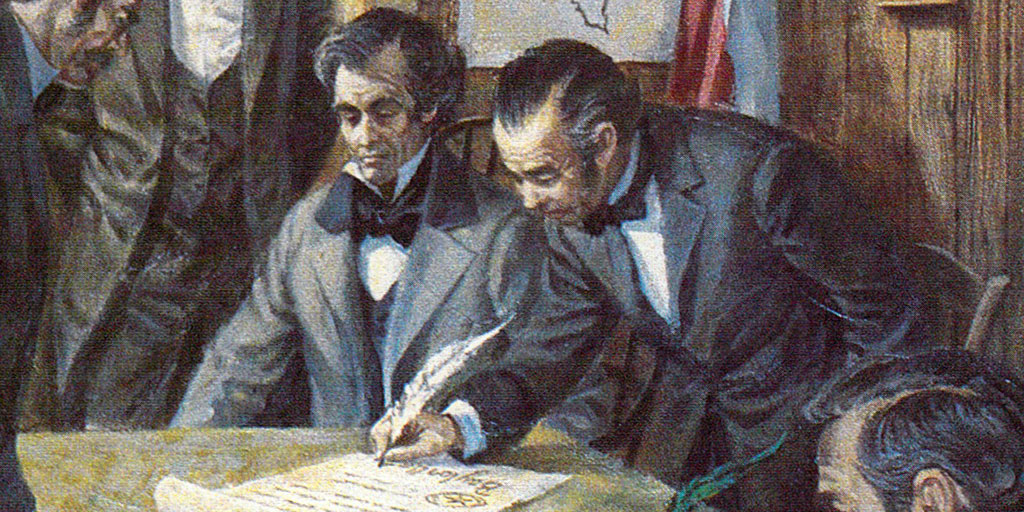William Tryon: Missionary, pastor, and Baylor Founding Father

How integral was William Tryon to the founding of Baylor University? Judge R.E.B. Baylor himself thought that our university, when it was chartered in 1845 by the Republic of Texas, should have been named after his fellow Baptist pioneer. Had Judge Baylor’s wishes been heeded, we’d all be TryonProud today.
While Judge Baylor’s humble suggestion was passed over, William Tryon clearly played an important part in our university’s founding. (That’s Tryon signing the charter document in the famous painting pictured above.) So who was this man?
It may come as a surprise to learn that one of the most important figures in Baylor and Texas Baptist history was actually a native of New York City. William Milton Tryon was born in NYC in 1809, and he was shaped for hard work and service at a young age. Just 11 years old when his father passed away, he learned to tailor clothing to support his mother and make ends meet. He pastored in Georgia and Alabama in his 20s, with a passion and ability that led to his service in Texas in 1841 at age 32.
A year earlier, James Huckins had been appointed by the American Baptist Home Mission Society as its first missionary to Texas, sent to plant churches throughout the region. In 1841, Tryon followed as the society’s second missionary to Texas; just a few months later, he became the first to suggest creating a Baptist university in what was then the Republic of Texas. As the moderator of the Union Baptist Association (and later as chaplain of the Texas Senate), Tryon had ample access to turn such a dream into reality.
Within Texas Baptist life, Tryon crossed paths with Huckins and Judge Baylor, who joined him in the vision of a “a Baptist University in Texas … that would be susceptible of enlargement and development to meet the needs of all the ages to come.” After three years of hard work and delays (as Huckins tirelessly raised funds), Tryon wrote a proposal which was presented to Texas Congress by Judge Baylor. On Feb. 1, 1845, Republic of Texas President Anson Jones signed the university’s charter and the wheels were in motion. Baylor felt it was Tryon whose efforts merited naming honors, but Tryon’s wishes for the name were granted, and Baylor University began welcoming students a year later.
Each of Baylor’s three Founding Fathers — Baylor, Huckins and Tryon — served on the university’s initial Board of Trustees, with Tryon as the Board’s first president. In December 1845, he was called as pastor of First Baptist Church of Houston. Unfortunately, like his father, Tryon would not enjoy a long life. He succumbed to yellow fever just two years later, passing on Nov. 16, 1847, at the age of 38.
Although his life was brief, his legacy has indeed lasted for “all the ages to come.” Monuments on either side of the famous Judge Baylor statue honor Huckins and Tryon, and each year on February 1, the Baylor Family honors the memory of those three men on Founders Day.
Sic ’em, William Tryon!
You might also like:
* Who was Judge Baylor? (May 2018)
* James Huckins: Missionary, church planter, and Baylor Founding Father (April 2017)
* Happy 170th birthday, Baylor University! (Jan. 2015)

